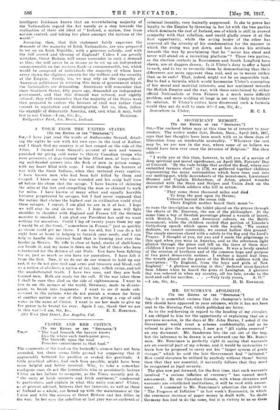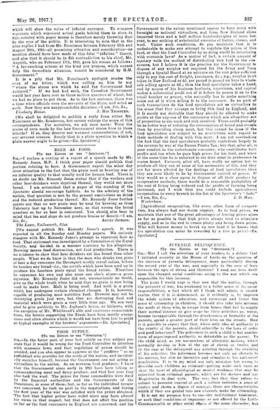MR. RUNCIMAN'S APOLOGIST.
[To THE EDITOR OF THE "SPECTATOR.") SIR,—It is somewhat curious that the champion's letter of the 19th should have appeared in your columns, while it has not been sent to the Morning Post, which published my letter.
As to the red-herring in regard to the heading of my circular, I am obliged to him for the opportunity of explaining that on a previous occasion, in the days of Mr. John Burns, I asked if the Government would treat a scheme confidentially, and as he refused to give the assurance, I now put "All rights reserved" on any document. Mr. Sanderson lets the cat out of the bag, but the inference to be drawn is an awkward one for Mr. Runci- man. Mr. Runciman is perfectly right in saying that warrants are an essential part of my scheme, and it would be instructive to learn how he proposed to carry out his "larger system of grain storage," which he said the late Government had " initiated." How could elevators be utilized by anybody without them? Seeing then that they are essential, it naturally follows that they must be recognized as legal security.
The plea now put forward, for the first time, that such warrants involved "a serious inflation of currency" has caused much amusement. By our Canadian friends, with whom elevators and warrants are established institutions, it will be read with amaze- ment. I commend to Mr. Runciman's attention the article on " The Progress of Inflation" in last week's Economist, in which the enormous increase of paper money is dealt with. No doubt Germany has had to do the same, but it is victory to us or them which will show the 'value of inflated currency. To compare warrants which represent actual goods behind them in store in this country with paper money is therefore merely throwing dust in the eyes of the public. It is interesting to note that in the nine replies I had from Mr. Runciman between February 16th and august 29th, 1915—all promising attention and consideration—no mention should have been made of this fatal "inflation" theory, and also that it should be in flit contradiction to his chief, Mr. Asquith, who on February 17th, 1915, gave his reason as follows: "A far-reaching scheme of the kind you propose, which cannot help the immediate situation, cannot be considered by H.M. Geivernment."
It is a pity that Mr. Runciman's apologist evades the crux of my letter, which was calling on him to say "where the stores are which he said the Government had initiated." If we had had such, the Canadian Government would last year have sent us three million quarters of wheat, but v.-e had no place to put them. As to the last sentence, there was a time when officials were the servants of the State, and acted as such. Now they are unapproachable dictators.—I am, Sir, &c., [We shall be delighted to publish a reply from either Mr. Runciman or Mr. Sanderson, but cannot enlarge the scope of this correspondence. For ourselves, we ask once more: Were the stores of corn made by the late Government stores here in those islands ? If so, they deserve our warmest commendation; if not our severest censure. Surely that is a plain question to which plaiu answer ought to be given.—En. Spectator.]



























 Previous page
Previous page